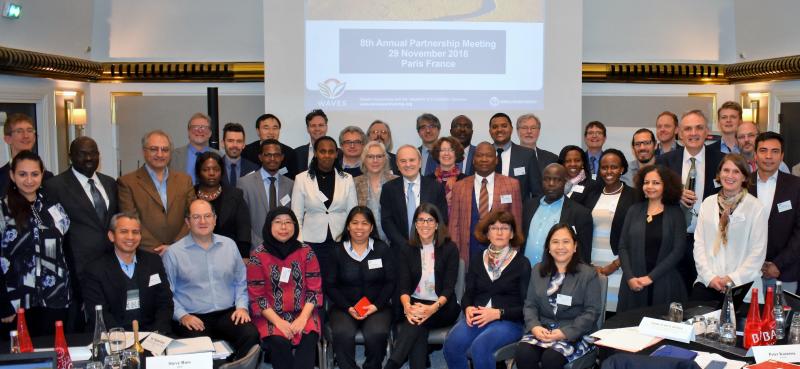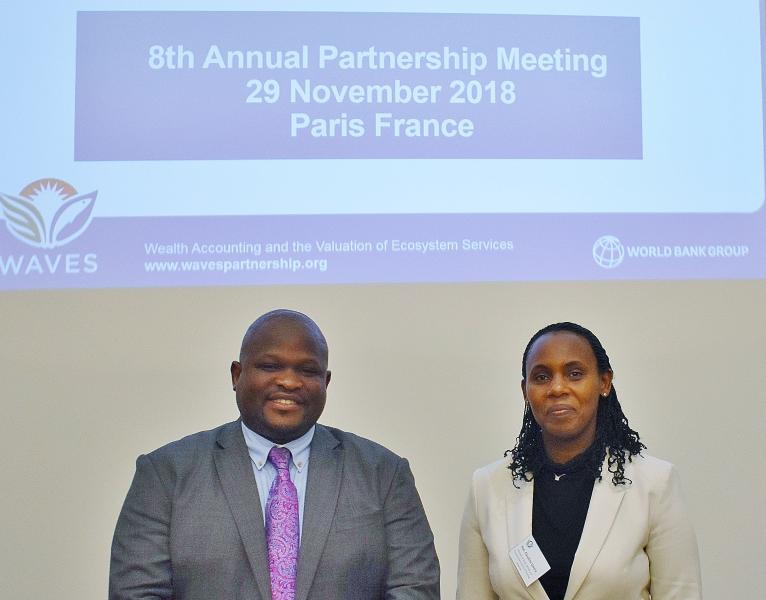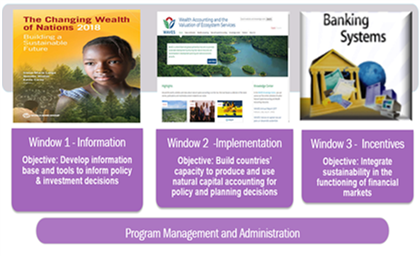
“We are determined to know the value of our natural wealth.”Alexander Chiteme, Minister of National Development Planning for Zambia said while opening the eighth Annual Partnership Meeting held in Paris, France from November 28 - 29, 2018. “Zambia has not been spared the ravages of climate change, especially in the agriculture sector. We evaluated our water, our forests, our minerals, and how they can be used better for economic growth. The information generated by Natural Capital Accounting (NCA) has been useful in advising policy interventions by the government and we would like to see it expanded not just in Zambia but to all countries.” He continued.
Uwera Claudine, Minister of state, Ministry of Finance and Economic Planning for Rwanda who jointly opened the meeting talked about the need to strike a balance between development ambitions and effective management of natural resources. “Rwanda is prone to frequent flooding and landslides that catalytically claim lives and destroy property. Rwanda recognizes and values the role of NCA in informing our development plans. We began implementing NCA in 2015 and since then we have not looked back’’ She added.
This year’s meeting was attended by nearly 60 participants working on NCA from around the globe — WAVES’ nine core-implementing countries, donor countries, UN agencies, and other partners. It was held back-to-back with the Natural Capital Policy Forum, which focused on biodiversity and climate change.

“All the WAVES countries took stock of the progress they are making towards implementing NCA. For example: Within one year of starting, Zambia has land, water and forest accounts. Indonesia and Rwanda, countries that started work earlier, are focusing on how to use accounts to answer their biggest policy challenges around land use. All the WAVES countries are now using accounts to make critical decisions around the management of natural resources, deal with trade-offs, and to monitor their progress towards SDGs and their national development plans and targets.
Indonesia, Guatemala and Rwanda: Forging ahead on accounts
The NCA continues to be a useful tool for informing public policy and planning. This was the common thread running through the presentations made by all the country representatives. Presentations from the Indonesia team garnered a lot of interest, especially on linking natural capital to macroeconomic indicators to attract attention from the Finance ministries.
“NCA continues to be a useful tool to inform public policy as it feeds into the narrative for low carbon development for the next mid-term plan for 2020-24,’’ said Sudhiani Pratiwi Deputy Director for Climate Change and Environmental Quality, BAPPENAS. In Indonesia, the information from the land, water, and ecosystems accounts will feed into the system dynamics model being used by the Planning Ministry (BAPPENAS) to inform the country’s mid-term plans and the long-term plan Indonesia 2045.
Providing an overview of the progress made in Rwanda, Peter Katanisa, former advisor to the Government of Rwanda informed the participants that NCA work is being transferred from the Ministry of Environment to the Ministry of Finance for better coordination and integration into national planning processes.
Guatemala presented their analysis on using ecosystem accounts and evaluating them against two climate change scenarios that has important findings relevant for policy makers.
The original WAVES countries: Showing the way
Botswana, Colombia, Costa Rica, and the Philippines, the countries that have now graduated from the WAVES program, have institutionalized accounts and are mentoring other countries on how to use accounts to monitor SDGs and/or national plans. For example:
Botswana has 13 people coordinated by the Ministry of Finance and Development (MFED) working on accounts. Its water, mineral and energy accounts have been updated for the fourth consecutive year. In addition, Edwin Itshekeng, Chief Economist in MFED, announced a new partnership between MFED & University of Botswana to promote collaboration in policy analysis, economic research, and capacity building in wealth accounting and NCA. "Botswana has come a long way in producing and institutionalizing accounts but now the expectation is to take it to the next level where we would like more international support to build capacity in policy analysis and using accounts in economic models to forecast scenarios." he said.
Costa Rica has formalized an inter-ministerial group the National Council of Environmental Accounts by Executive Decree headed by the Environment Minister. “There is increasing support from the highest levels of the government to continue work on NCA. This has enabled us to respond to international requests with systematic, organized information like SDG monitoring and OECD.’’ said Irene Alvarado Quesada, Coordinator, Environmental Statistics Unit, Central Bank.
Global developments on NCA: New Approaches
Several new approaches and tools were presented that show the fast-evolving field of combining environment and economics:
- Machine learning for modelling ecosystem services by Lars Hein from Wageningen University
- Payment for Environmental Services and how NCA can be useful by Stefano Pagiola, World Bank.
- Italy’s new Natural Capital Report by Aldo Ravazzi, Chief Economist, Ministry of Environment, Italy
- How to integrate natural capital into macro-economic modelling for policies by Pasquale Lucio Scandizzo from the University of Rome
- The findings from The Changing Wealth of Nations by Glenn-Marie Lange from the World Bank
In looking ahead and discussing the future of WAVES, Raffaello Cervigni, Program coordinator for WAVES presented the new initiative, the Global Program on Sustainability (GPS). This expands the work initiated by WAVES in response to an evolving environment, including new demands on the policy side, new tools, and recent methodological developments. For the first time, the program will work with the financial community to address a new application of NCA.
Moving ahead

In addition to expanding and improving on The Changing Wealth of Nations, and the country implementation experience through WAVES, GPS will work with the financial community to provide solid information on environmental risks and performance. This pillar of GPS targeted towards pension funds, asset managers, and countries wanting to improve their risk ratings, and will be co-led by the Environment global practice along with Finance, Competitiveness and Innovation (FCI) and Treasury.
